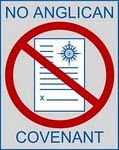
Simon Sarmiento is reporting that the bishops of the CofE have not only commended the Anglican Covenant for adoption by the Church of England, but have also taken steps to ease its adoption. Still, passage is by no means certain, judging from the comments at Thinking Anglicans.
Katie Sherrod and Fr. Mark Harris have written useful commentary on the covenant’s reception by The (American) Episcopal Church, especially in relation to the recent visit of Canon Kenneth Kearon to the TEC Executive Council. You can read Katie’s thoughts and observations here and here. Canon Kearon is Secretary General of the Anglican Communion. Fr. Harris’s relevant posts are here, here, here, and here. The background of Fr. Harris’s reference to “mitregate” is a recent appearance of American Presiding Bishop Katharine Jefferts Schori as preacher and celebrant at Southwark Cathedral, London, where she was granted permission to preach and celebrate by The Archbishop of Canterbury but told she must not wear her mitre or carry her crozier.
Bishop Schori received a veiled apology from the Dean of Southwark Cathedral, though not from the ABC, and has reacted to this latest attempt to shame her with the aplomb of a canny American feminist who understands that there is no such thing as bad publicity. The more her enemies and the enemies of the ecclesial openness she represents attempt to denigrate her (and the attempts are serious, misogynistic, and hateful), the more sympathy she garners for her cause and the stronger she becomes.
I am opposed to the The Anglican Covenant, to the whole of it and not merely to section four which permits the church to discipline and punish. Were my church to constitute itself as the confessional body envisioned in the covenant, I would have to part company with my church. I have enough trouble with the Nicene Creed as it is, and believe that orthodoxies generally are pernicious things that require coercion for their establishment. But I also think the ABC’s refusal to allow Bishop Schori to preside at Southwark wearing the symbols of her office was not merely the coercive act of a petty authoritarian, not only a slight and an offense to Bishop Schori, to Americans and to the American church, but something more as well. Fr. Jake is featuring a challenging post the last few days entitled, “The Dark Side of Canterbury…Perhaps,” whose thesis is that the ABC is projecting power towards TEC because he has realized that we may need him more than he needs us since some of our present property disputes may hang on our membership in the Communion. I am thinking Fr. Jake is right and that there may be an even darker dimension to the ABC’s political maneuvering.
It seems clear that Dr. Williams not only wants to hold the Anglican Communion together, but that he also wants to preserve the primacy of the established English church. He is, after all, a peer of the realm by virtue of his office, and he has as recently as last February argued in the House of Lords in opposition to the prohibitions against discrimination contained in Britain’s new equality legislation. It seems unlikely that such a peer would wish to be reduced in stature or to be the cause of his national church’s diminution in stature in relation to the various colonial primates and churches who are presently subjecting him to great pressure. By promulgating the covenant, and now by getting out in front of it politically and fostering (by whatever means) its quick adoption by the general synod, perhaps Dr. Williams preserves advantage over the colonials as well as gaining leverage with TEC.
In light of these thoughts it’s interesting to note the recent appearance of three new Facebook pages, here, here, and here.
One more thing. The Episcopal Church’s prophetic positions with regard to gender roles and sexual orientration inevitably proclaim the bigotry of patriarchy and homophobia. The contentions generated by these proclamations cannot merely be held in tension. As Terry Eagleton has put it, “there are a good many important contentions which someone is going to have to win and someone else to lose.” Reactionary Anglicans (who may now count Dr. Williams as one of their number) understand that they cannot win social justice arguments about gender and sexual orientation and have chosen to cast these contentions rather as arguments over tradition and the authority of scripture. For a good many years now, Dr Williams has been developing and expanding a theological understanding of Christian identity that puts him on the side of traditionalists. I’m presently reading his recent book on Dostoyevsky, which seems to be a major statement of that theological understanding, and intend to post an essay about it in the fairly near future.
